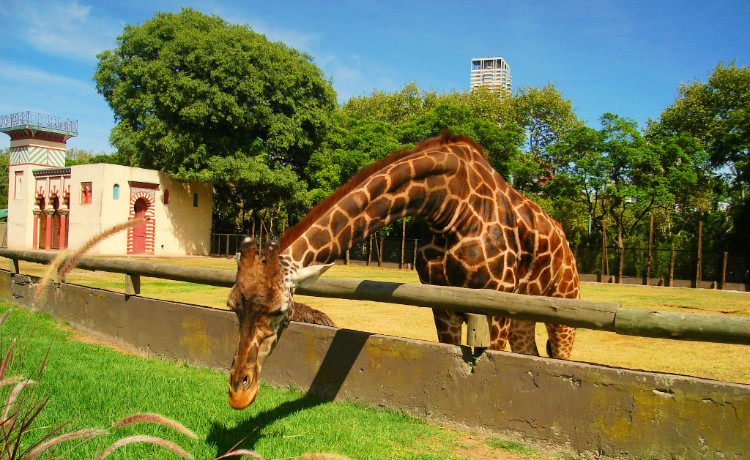

Imagem: Wikimedia Commons
A cidade de Buenos Aires, capital da Argentina, vai fechar seu zoológico fundado há 140 anos, sob a justificativa de que manter animais cativos e em celas é algo degradante.
O prefeito Horacio Rodríguez Larreta disse que os 2,5 mil animais do zoológico serão gradualmente transferidos para reservas naturais do país que podem proporcionar um ambiente mais apropriado para eles viverem. A área de mais de 4 mil metros quadrados do zoológico, no bairro de Palermo, vai se tornar um parque ecológico, que deve ser aberto ao público até o fim de 2016.
O novo parque ecológico será “um local em que crianças poderão aprender a cuidar dos animais e ter contato com diferentes espécies”, disse o prefeito. “Temos que valorizar os animais. O modo como eles vivem aqui definitivamente não é o jeito de fazer isso”.
Algumas das espécies de pássaros do zoológico serão soltas em uma grande reserva ecológica da capital. Animais mais idosos e instáveis permanecerão no local atual, mas sem exibição ao público.
O novo parque ecológico também irá prover reabilitação e refúgio para animais resgatados de tráfico ilegal, disseram as autoridades.
Apesar de ser uma grande atração da cidade, o zoológico municipal estava perdendo popularidade nos últimos anos. Episódios envolvendo falta de condições adequadas para animais, como ocorrido com ursos polares em temporadas de verão, também trouxeram má publicidade ao local.
“O mais importante é quebrar o modelo de encarceramento e exibição”, disse o advogado dos direitos dos animais Gerardo Biglia, um grande incentivador do fechamento do zoológico, em declarações à imprensa local. Biglia ressaltou que a mudança está vindo e que as crianças de hoje consideram óbvio que é errado manter animais aprisionados.
Fonte: The Guardian
Veja também:
–Zoológico promove arte com “gorilas” e levanta problema da preservação ambiental com a espécie
Buenos Aires has announced plans to close down its 140-year-old zoo, arguing that keeping wild animals in captivity and on display is degrading.
Mayor Horacio Rodríguez Larreta said that the zoo’s 2,500 animals will be gradually moved to nature reserves in Argentina which can provide a more suitable environment. The 44-acre zoo in the Palermo neighbourhood will become an ecopark when it is reopened later this year.
“This situation of captivity is degrading for the animals, it’s not the way to take care of them,” said Rodríguez, at a ceremony on Thursday.
The new ecopark will be “a place where children can learn how to take care of and relate with the different species”, the mayor said. “What we have to value is the animals. The way they live here is definitely not the way to do that.”
Some of the zoo’s bird species will be released in the Reserva Ecológica, a riverside ecological reserve covering 864 acres in Buenos Aires. Older animals and those too infirm to be moved will remain at the current site.
The new ecopark will also provide refuge and rehabilitation for animals rescued from illegal trafficking, city officials said.
Buenos Aires zoo was one of the city’s main tourist attractions, but despite its popularity, the decaying zoo had been running a loss for its private concessionaires.
It had also attracted bad publicity in recent years, particularly regarding the desperate plight of its captive polar bears during the city’s oppressively hot summers. The zoo’s last remaining polar bear, called Winner, died three and a half years ago partly due to soaring temperatures and inadequate conditions at the zoo.
“The most important thing is breaking with the model of captivity and exhibition,” animal rights lawyer Gerardo Biglia, a long-time campaigner for the closure of this city’s zoo, said in statements to the press. “I think there is a change coming for which we are already prepared because kids nowadays consider it obvious that it’s wrong for animals to be caged.”
Among the 50 animals staying behind will be Sandra, an orangutan that made
international headlines two years ago when a Buenos Aires court declared her “a non-human person” deserving rights.
“The problem is Sandra is a hybrid of Borneo and Sumatra orangutans so she doesn’t socialize,” Biglia said. But Sandra and the other animals that cannot be moved will no longer be exhibited to the public, city officials said.
Utilizamos cookies para oferecer uma melhor experiência de navegação. Ao navegar pelo site você concorda com o uso dos mesmos.
Saiba mais